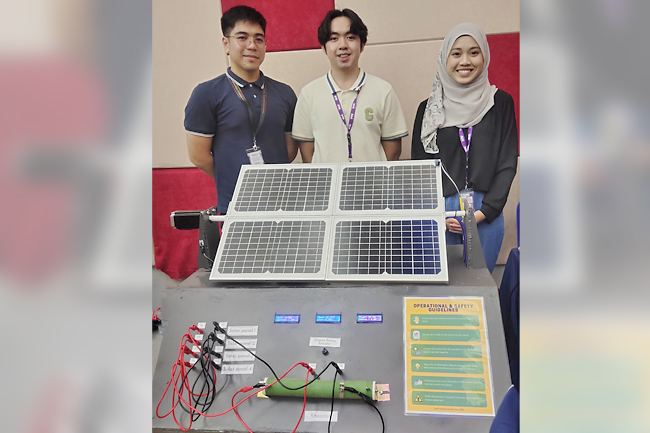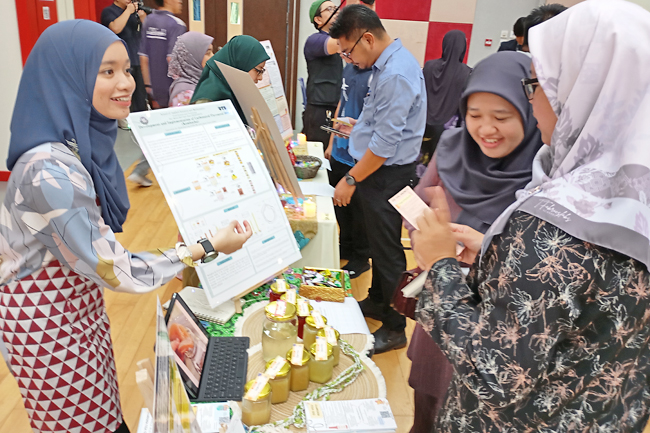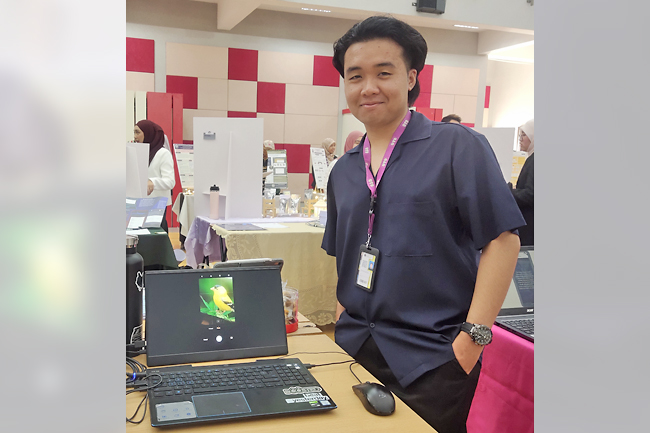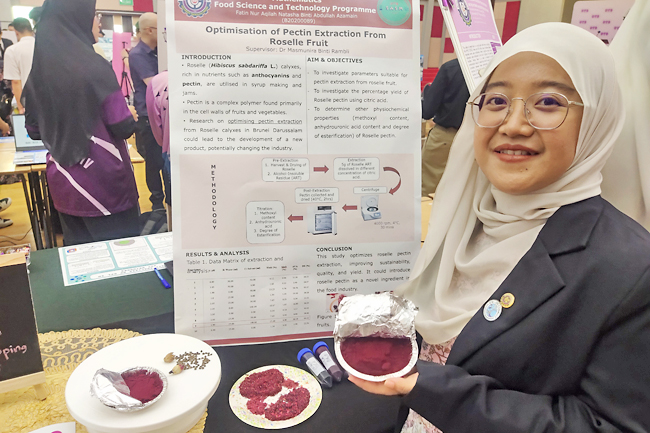The Universiti Teknologi Brunei (UTB) 2024 Project Exhibition reflects the vibrant creativity and commitment to sustainability among its student body, all captured within the theme ‘Inventive Minds, Sustainable Visions: Merging Creativity and Responsibility’.
Hosted jointly by the Faculty of Engineering (FEng) and the Centre for Communication, Teaching and Learning (CCTL), this annual event coincided with the esteemed Brunei Mid-Year Conference and Exhibition (Brunei MYCE) 2024.
Spread across the multipurpose hall and Engineering Faculty building, the exhibition provided a platform for 376 student projects, spanning diverse disciplines including FEng, CCTL, UTB School of Business (UTB SB), School of Computing and Informatics (SCI), School of Applied Sciences and Mathematics (SASM), and the School of Design (SDe).
EMPOWERING AWARENESS OF SOLAR ENERGY
Upon entering the Multipurpose Hall, visitors were immediately drawn to one standout exhibit: the ‘Solar Panel Educational Trainer’, a collaborative effort by three UTB students majoring in Electrical and Electronic Engineering within the FEng.
Consisting of Zikry Amani bin Azma’in, Arif Rusyaidi bin Abdul Rahman, and Nadeeya binti Muhammad Muslley, the trio explained that their project is a device that operates on the principles and applications of solar energy conversion.
It allows the public to measure the voltage, current, and power of solar panels under varying light intensities, shades, angles of incidence, and different connection combinations.
The project’s objectives include fabricating a solar energy device for educational purposes, guiding the public on how solar panels work, and promoting sustainable solar energy for the future.
“It is believed that such projects have the potential to serve as an important initial phase in convincing the public to transition towards accepting greener energy sources, especially as we collectively strive to achieve Brunei Vision 2035,” they stated.




BIRDSONG RECOGNITION
Meanwhile, a project sparked by a personal interest in biodiversity and bird species found in Brunei Darussalam has propelled one final year student pursuing a Bachelor of Science in Computing at UTB, specialising in Software Development, Muhammad Eddy Syazwan bin Suhardy, to develop a user-friendly mobile application for bird sound recognition.
Named ‘Kicau Recognizer’, Muhammad Eddy explained that the application is specially designed for bird enthusiasts, nature lovers, ornithologists, and anyone interested in identifying bird species through their sounds.
“The technology used includes sound recognition technology to identify bird sounds, as well as Flutter for mobile application development. Additionally, I utilised Flask and Python for the backend, including data processing and machine learning algorithm implementation,” he said.
Muhammad Eddy also notes that our country is rich in unique bird species, but there aren’t many applications specifically designed to identify and understand local birds.
Inspiration also came from the need for an educational tool that could help the community recognise and appreciate our environment more deeply.
“This project has various benefits, including raising awareness about local biodiversity and the importance of environmental conservation. It can also be a valuable educational tool for schools and research institutions.
“For the general public, this application can foster interest and knowledge about local birds, thereby increasing pride in our natural heritage,” he further explained.
In the meantime, he hopes that this project will be well-received by the community and can be utilised collectively, while also inspiring more students and researchers to explore technology in the field of biodiversity.
A JOURNEY IN FOOD SCIENCE AND TECHNOLOGY
With the aim of highlighting the benefits that can be derived from the Roselle fruit, one student from the School of Applied Sciences and Mathematics (SASM) under the specialisation of Food Science and Technology Program, Fatin Nur Aqilah Natasha binti Abdullah Azamain, also took the opportunity to showcase her research findings entitled ‘Optimisation of Pectin Extraction From Roselle Fruit’.
In sharing her insights, she emphasised that the Roselle flower, with its captivating red beauty, not only serves as an ornamental plant but also holds various health benefits for those who incorporate it into their diets.
Roselle, scientifically known as Hibiscus sabdariffa L, is commonly used to make a tangy beverage, producing a refreshing taste that lends itself well to various culinary creations such as jams and syrup juices.
“Pectin is a complex polymer mainly found in the cell walls of fruits and vegetables.
Research on optimising pectin extraction from Roselle petals can potentially contribute to increasing product output in the food industry,” she added.
Touching on the methodology employed in her research, Fatin explained that it is divided into specific stages, starting from Pre-Extraction involving the harvesting and drying of Roselle fruits and Alcohol-Insoluble Residue (ART) sessions, leading up to the centrifuge and titration processes.
FOSTERING COLLABORATION
The one-day exhibition aimed to showcase and celebrate the achievements of final year students, with the exhibition theme reflecting the innovative thinking of the students and their commitment to generating solutions that are not only creative but also sustainable, merging creativity and responsibility in their projects.
In essence, the execution of the exhibition not only provided a platform for students to present their ideas but also aimed to foster a spirit of collaboration.
It served as an excellent opportunity for both public and private organisations to identify potential talents and explore collaborative potentials, contributing to the growth of both industrial and academic sectors. – Nurdiyanah R





